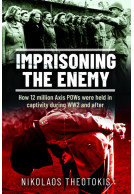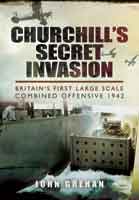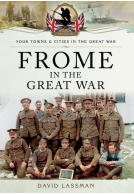Death and Deprivation on the Forgotten Sumatra Railway (Hardback)
A Prisoner's Story
Imprint: Pen & Sword Military
Pages: 168
Illustrations: 33 black and white illustrations
ISBN: 9781399006491
Published: 29th July 2021
(click here for international delivery rates)
Need a currency converter? Check XE.com for live rates
| Other formats available - Buy the Hardback and get the eBook for £1.99! | Price |
|---|---|
| Death and Deprivation on the Forgotten… ePub (20.1 MB) Add to Basket | £6.99 |
James Henry Banton was born in Burton on Trent in 1920. He worked as a driver of a steam locomotive used to used to transport beer and supplies to breweries around the town. When war broke out Jim joined the RAF, eventually becoming a Leading Aircraftsman as part of the RAF’s ground crew. During this time Jim had met the love of his life Dorothy Mason. Jim didn't know that when he left Gladstone Dock in Liverpool he would not see home or his family including Dorothy for another four and a half years.
Eventually posted to the Far East he was captured by the Japanese in the hills on the island of Java. Used as slave labour, starved, beaten and witnessing death on a daily basis he was later put to work on the building of the Sumatra Railway. The Far East Prisoners of war became known as the Forgotten Army, however there has been little reference paid to the Sumatra Railway compared with other theatres of WW2. With this in mind the prisoners who worked on the Sumatra Railway could be considered to be the ‘Forgotten of the Forgotten Army’.
In August 1945 the world celebrated victory in Europe, however for the FEPOW’s the war dragged on. As parts of the world were trying to return to normality Jim and his colleagues were being made to dig their own graves in the Sumatra jungle. The FEPOW’s lives hung in the balance as orders had been issued to murder all POW’s should mainland Japan be invaded by the Allies.
This book is Jim’s story and it is hoped it will also be a reminder not only of the sacrifice of the Forgotten Army but also highlight the suffering of the ‘Forgotten of the Forgotten Army’ – The Sumatra Railway POW’s.
All in all a very well written and complete account of a life well lived. There are very stark comparisons from peace to war to POW to peace again and rehabilitation. A good read.
ARRSE (Army Rumour Service)
Read the full review here
Don't forget their sacrifices
Amazon Customer
Read the full review here
“An interesting story of one man’s life from early days through his time in SE Asia, the Sumatra Railway, repatriation and later life. Effectively James Banton’s autobiography with help from his wife and sun. Interesting read in that it covers the build up to war and the struggle to survive after it along with interaction from fellow FEPOWS members in later life."
FEPOW & COFEPOW
Ex-POW's harrowing story of losing 19 mates in a day on wartime death railway
Derby Telegraph 24/08/21
Ex-PoW’s story of losing 19 of his mates in a day
Burton Mail 23/08/21
James Banton weaves an interesting story, written for the benefit of his family, and read and published after his death. When war was declared in 1939 James Banton volunteered for the RAF. Twelve months later, in Malaya, Leading Air Craftsmen Banton describes the confusion and chaos caused by Japanese aircraft bombing RAF airfields destroying most of British air-cover. This was quickly followed by Japanese ground troops crossing the Thai border into Malaya, their swift advance down the Malaya peninsula, and the Singapore Garrison's surrender 70 days later.
Richard Gough - Historian, writer, author of the Escape from Singapore, The jungle was Red, Outpost of the Empire, SOE Singapore 1941-42. Waiting publication Tony Poe, CIA Paramilitary in SE Asia.
With colleagues James Barton was evacuated to Java, where he was captured a remained a prison of war for three and half years. Much has been written about the death railway in Thailand, formerly Siam but for many people the railway in Sumatra is unknown. The treatment from barbaric guards, death, and deprivation remained the same. When local people rumoured that the war had ended, the camp's British Commanding Officer sought confirmation. His Japanese counterpart attempted to slice him in half with his sword.
What adds to this remarkable story is James Banton description of both pre and post war Britain. Hastily married before he left for Singapore, three and half years later, starved and brutalized he was home, had wife and young child to care for, search for where to live and a job to find. Like many who returned from the war, he said nothing and remained evasive to the question of 'what you do in the war dad.' He did write notes which form the basis of the book which is a page turner.
Rating: 5 out of 5 stars
NetGalley, Ron Baumer
A truly inspirational book on overcoming and surviving as a POW in Japan and Malaysia during WW2. The hardships faced by the men were heartbreaking. A great read.
Started reading the book and found it very hard to put it down.
Ronnie Taylor
Highly recommend the book to all those who had relatives as PoWs in Sumatra during WWII. Plus anyone interested in reading about the Sumatra Railway, the book will open their eyes to the nightmare existence under the Japanese.
I have posted a review on the FEPOW Family Facebook Group, which I run. We have many relatives of PoWs who were forced to work on building this railway. The book will add more informormation to their researching loved ones.
Ronnie Taylor - FEPOW Family
About James H Banton
The memoir Death and Deprivation on the Forgotten Sumatra Railway is published by James H Banton's son, Keith Banton.
My Dad would never tell us about his experiences during the war so as a compromise I asked him to write about his life and promised not to read it whilst he was still alive. This was done over several of his retirement years and it is only now after his passing in 2003 that I have had his story published.
I have no idea what he would think about this as he was quite a private man however what doesn’t get remembered in history could get repeated.
Women Interned in World War Two Sumatra Faith, Hope and Survival (Hardback)
Thousands of women and children were among those who struggled to leave Singapore just before capitulation on February 15 1942; their hope was to reach safety. For many that hope was never realised; countless numbers drowned as ships were bombed and sunk on their way to ‘safety’. The ‘lucky’ ones who survived the onslaught of the ships would become guests of the Japanese; many of these would not live to see the end of the war. Two very different women fleeing on those last ships and subsequently interned in camps throughout Sumatra were Margaret Dryburgh, a missionary and teacher, and…
By Barbara CoombesClick here to buy both titles for £31.49
















